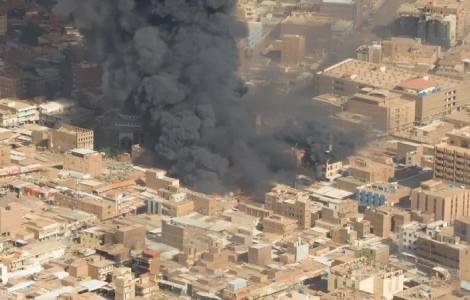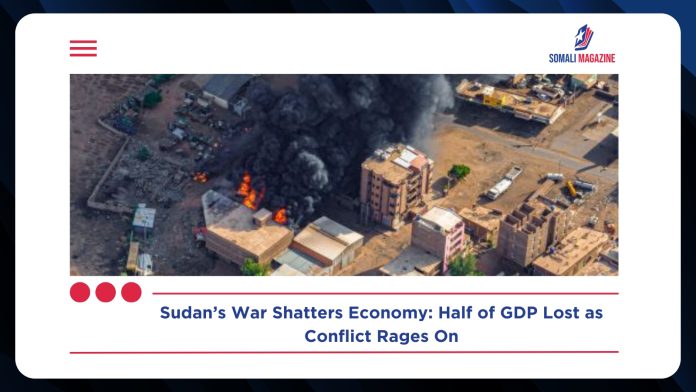Facebook Twitter (X) Instagram Somali Magazine - People's Magazine
Sudan war blows up half its GDP, plunging the country into one of the worst economic collapses in modern African history. Since the outbreak of fighting between the Sudanese Armed Forces (SAF) and the Rapid Support Forces (RSF) in April 2023, the nation’s economy has been decimated, with estimates showing a contraction of nearly 50% in gross domestic product by the end of 2024.
According to a recent World Bank report and economic modeling by the International Food Policy Research Institute (IFPRI), Sudan’s GDP shrank by 29.4% in 2023 and a further 13.5% in 2024, reflecting the widespread destruction of infrastructure, disruption of trade, and collapse of public services. The war has not only displaced over 12 million people but also dismantled the state’s ability to function, with government revenues falling below 5% of GDP and inflation soaring to 170%.
The Sudanese pound has lost more than half its value, with black-market exchange rates exceeding 2,600 pounds per dollar. Unemployment has surged to 47%, and extreme poverty now affects 71% of the population—more than double the pre-war rate.
The agricultural sector, which accounts for 35% of GDP and over half of all jobs, has been particularly hard hit. Grain production fell by 46% in 2023, and yields of staple crops like sorghum and millet dropped by more than 50% compared to pre-war averages. Yet, experts believe agriculture could be the cornerstone of recovery if peace is restored and investment is directed toward rebuilding irrigation systems, roads, and storage facilities.

The war has also devastated Sudan’s banking system. Over 70% of bank branches, most of which were concentrated in Khartoum, ceased operations within the first month of the conflict. With no functioning financial institutions, the country’s monetary system has effectively collapsed, making any economic reform nearly impossible without first ending the war.
Illicit financial flows and a booming shadow economy have further complicated the crisis. Gold smuggling, arms trafficking, and parallel currency markets are now the primary engines of economic activity, fueling the conflict rather than development. A Chatham House report revealed that up to 80% of Sudan’s gold production is smuggled out of the country, primarily to the UAE, and used to finance militias.
The World Bank has proposed a three-pronged recovery plan focused on economic reform, infrastructure investment, and social justice. However, critics argue that these recommendations are detached from the realities of a war economy and fail to address the root causes of the conflict, including military control over state resources and the absence of transitional justice.
Without an immediate ceasefire, experts warn that even the most well-intentioned recovery plans will remain theoretical. The war has not only destroyed Sudan’s economy, but it has dismantled the very institutions needed to rebuild it.
As the international community grapples with how to respond, Sudanese civilians continue to bear the brunt of a conflict that has turned their country into a humanitarian and economic wasteland. The road to recovery will be long and uncertain, but without peace, there can be no progress.

